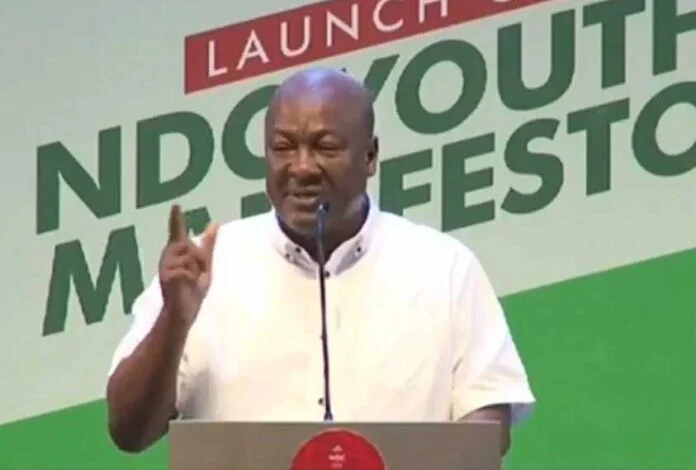The Executive Director for Educate Africa Institute, William Boadi has questioned the rationale of former President John Dramani Mahama, the flagbearer of the National Democratic Congress’s pledge to abolish academic fees for first-year university students if elected in the 2024 upcoming elections.
While the promise has been welcomed by many as a potential game-changer for higher education in the country, Mr Boadi raised several critical questions about its feasibility, sustainability, and broader impact on the country’s educational and employment landscape.
The Executive Director of Educate Africa Institute (EAI) provided a thorough analysis of former President Mahama’s pledge, urging Ghanaians to consider not just the immediate benefits, but the long-term implications for the country.
Mr Boadi’s statement highlighted several key areas of concern that need to be addressed if such a policy is to be successfully implemented and truly beneficial for the future of Ghana.
“The ability to implement such a policy hinges on securing adequate financial resources, scaling up university infrastructure, and ensuring long-term sustainability without negatively affecting the national budget or other vital services”.
William Boadi, Executive Director of Educate Africa Institute (EAI)
According to the educationists, securing adequate financial resources to support this initiative is critical, emphasizing that without a clear funding plan, the policy could strain the national budget and divert resources from other essential services.
He further explained that the success of the policy hinges on whether the government can balance the costs with the need to invest in other sectors, such as healthcare, infrastructure, and social services, which are equally vital for national development.
Furthermore, William Boadi stressed the importance of scaling up university infrastructure to accommodate the potential surge in enrollment that could result from the removal of financial barriers.
He argued that while the policy aims to increase access to education, there is a need for the government to ensure that universities have the capacity to maintain high standards of education without compromising quality.
This, he asserted would require significant investments in classrooms, laboratories, and student housing, as well as in recruiting and retaining qualified faculty.

Educational Quality and Comprehensive Support
Moreover, Mr Boadi raised concerns about the broader implications of focusing solely on access to education without addressing the quality of education and the support systems needed for students beyond their first year.
“Addressing the pressing need for educational access is crucial, yet it must be balanced with ensuring educational quality and support systems for students beyond their first year.
“While removing financial barriers can boost educational attainment, maintaining high educational standards and providing scholarships or financial aid for continuing students are essential components of a comprehensive approach to educational reform”.
William Boadi, Executive Director of Educate Africa Institute (EAI)
The EAI leader advocated for a holistic approach that goes beyond tuition elimination, urging reforms that ensure students receive a quality education that equips them with practical knowledge and problem-solving skills.
This, he noted must include updating curricula to reflect industry-relevant skills, fostering partnerships with businesses for internships, and enhancing faculty training.
“Increasing access to education without these complementary measures risks producing graduates who are ill-prepared for the challenges of the modern job market,” Boadi cautioned.
Graduate Unemployment and Teacher Welfare
Additionally, William Boadi, the Executive Director of Educate Africa Institute expressed concerns over graduate unemployment in the country.
He argued that any educational reform must be closely aligned with policies that stimulate job creation and align educational outcomes with labour market needs.
“We must ensure that our education system is not just producing graduates, but graduates who are employable and ready to contribute to the economy,” he asserted.
Mr Boadi thus called for improved conditions for university teachers, pointing out that any attempt to enhance education quality must include fair compensation, better working conditions, and constructive dialogue with the University Teachers Association of Ghana (UTAG).
He also emphasized the importance of resolving issues related to “past pay policies” to maintain trust and morale within the education sector.
The overarching message from Boadi and the Educate Africa Institute is that political promises, while potentially transformative, must be grounded in realism and sustainability.
“We must be cautious of promises that sound appealing but may not be feasible in the long run”, Mr Boadi warned.
He emphasized that the ultimate goal for political leaders is to implement policies that not only promise access but also enhance the quality and applicability of education, and ultimately, improve employment prospects for graduates.
“By focusing on these critical areas, we can work towards a future where Ghana’s educational and employment systems are robust, effective, and sustainable”, he concluded.
READ ALSO: GSE’s First Weekday Trading Hits GHS33.9m with GGBL and NewGold ETF as Top Gainers




















